Chineke! Chamber Ensemble / Martineau & Osborne / SCO, Marshall, Edinburgh International Festival 2022 review - great musicians, not always great music | reviews, news & interviews
Chineke! Chamber Ensemble / Martineau & Osborne / SCO, Marshall, Edinburgh International Festival 2022 review - great musicians, not always great music
Chineke! Chamber Ensemble / Martineau & Osborne / SCO, Marshall, Edinburgh International Festival 2022 review - great musicians, not always great music
Quality playing, but the content didn't always match the execution
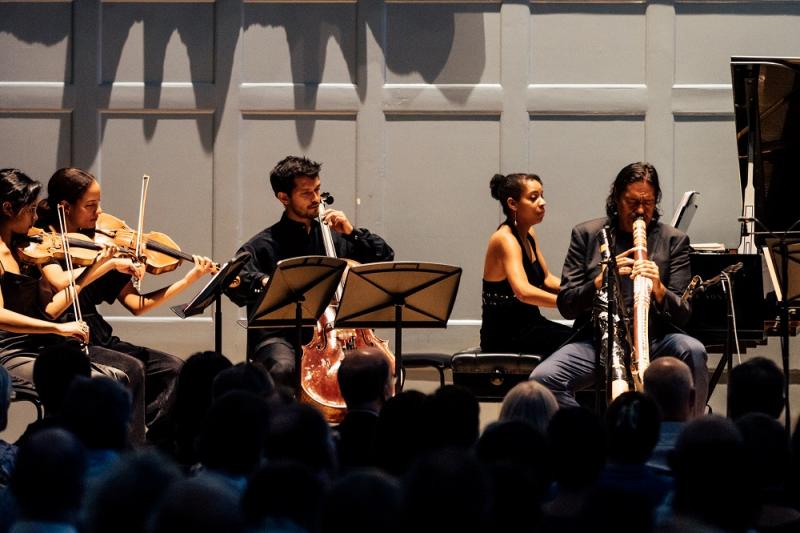
What happens when great musicians play weak music? I couldn’t help but think about that while I listened to the musicians of Chineke! Chamber Ensemble (★★) on Friday morning in Edinburgh’s Queen’s Hall. Chineke! was founded to provide opportunities for black and ethnically diverse classical musicians, so it’s a logical step for them also to promote music written by non-white composers, too.
Every piece in the concert's first half felt humdrum and spun out, the composers either failing to come up with exciting material, or not being sure what to do with what they’d found. The music of black American composer William Grant Still’s Folk Suite No1 at least had some appealing folk melodies in it but, aside from the poignantly affecting harmonies of Sometimes I feel like a motherless child, the composer was reduced to clunky accompaniments chugging underneath his tunes. Valerie Coleman, a contemporary American composer, wrote Red Clay and Mississippi Delta for five wind players, but gives them little to do beyond wheeze alongside some blues riffs, creating a piece that’s fun but slight. 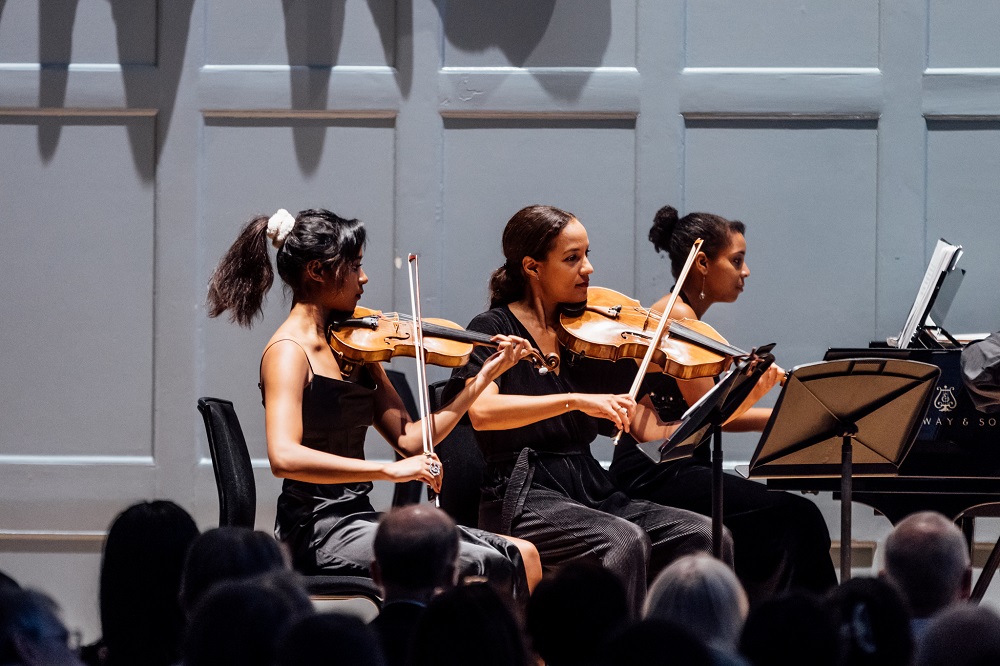 The music of two First Nation Australians didn’t fare much better. Deborah Cheetham’s Ngarrgooroon – Woven Song featured some interesting, wandering lines of melody, the harmonies for which Cheetham writes beautifully. It’s spun out long beyond its natural running time, though, and five minutes could happily be cut. It’s a model of restraint compared to the music by William Barton, though. A vocalist, composer and didgeridoo artist, Barton begins The Rising of Mother Country with the eerie sound of his voice floating in from the back of the hall against an unsettled instrumental texture. A viola eventually stirs up warmer strands of sound, against with Barton’s didgeridoo and voice provide texture, and the music slides into different harmonies and keys as it progresses. It’s far too long, though, spinning out small fragments of material in a way that becomes repetitious and dull. He then played a tedious encore which featured his own made-up language to sing short lines of melody against repeated chord patterns.
The music of two First Nation Australians didn’t fare much better. Deborah Cheetham’s Ngarrgooroon – Woven Song featured some interesting, wandering lines of melody, the harmonies for which Cheetham writes beautifully. It’s spun out long beyond its natural running time, though, and five minutes could happily be cut. It’s a model of restraint compared to the music by William Barton, though. A vocalist, composer and didgeridoo artist, Barton begins The Rising of Mother Country with the eerie sound of his voice floating in from the back of the hall against an unsettled instrumental texture. A viola eventually stirs up warmer strands of sound, against with Barton’s didgeridoo and voice provide texture, and the music slides into different harmonies and keys as it progresses. It’s far too long, though, spinning out small fragments of material in a way that becomes repetitious and dull. He then played a tedious encore which featured his own made-up language to sing short lines of melody against repeated chord patterns.
I’m 100% in favour of getting unfamiliar music out there, whatever their ethnicity, and yes: let’s promote the music of composers whose racial background provides them with fewer opportunities. But let’s try and find better music with which to do it. There’s bound to be more out there that’s written with stronger technique, more engaging musical lines and more economically used materials. The musicians themselves seemed to be playing it with seriousness and commitment, but didn’t they wonder whether there was a sense of the Emperor’s new clothes to the whole thing? 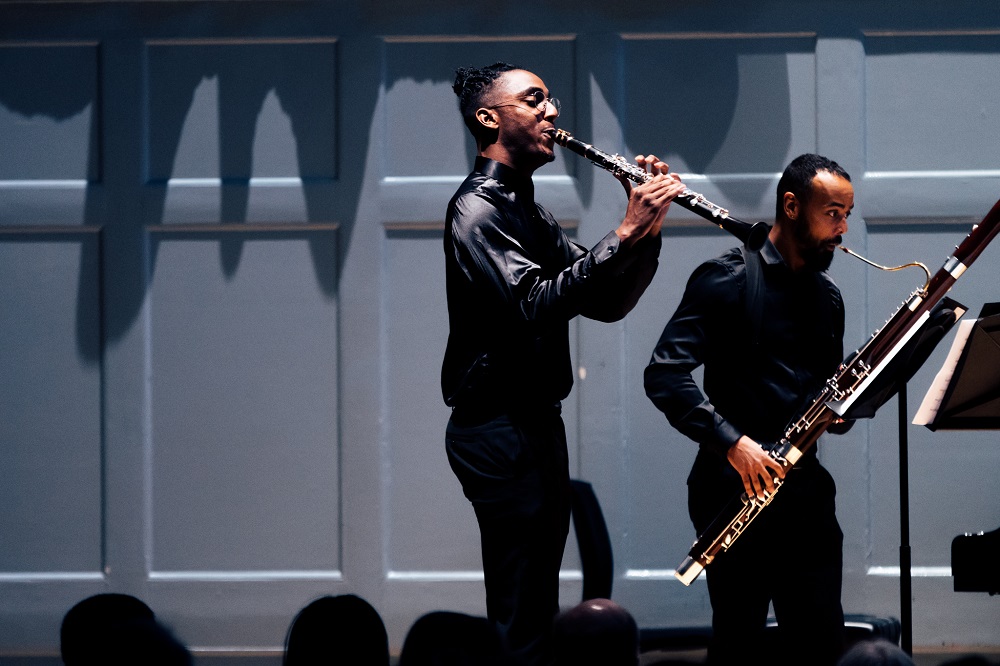 Mendelssohn’s Piano Sextet, which featured in the second half of the programme, showed what they could do with some music that was well written and seriously constructed. With its warm harmonies and purposeful musical stride, it felt like a breath of fresh air in comparison. It also felt like an afterthought.
Mendelssohn’s Piano Sextet, which featured in the second half of the programme, showed what they could do with some music that was well written and seriously constructed. With its warm harmonies and purposeful musical stride, it felt like a breath of fresh air in comparison. It also felt like an afterthought.
Of course, not all music written by white male westerners is great, something you could notice forcefully on Saturday morning with all thirty-three of Brahms’ Liebeslieder Waltzes. These trifles are musical indulgences, a world away from the technical triumphs of Brahms’ symphonies, concertos and chamber music. They sound completely lovely, though. Not only do they play on the emotions in all the right ways, but they’re condensed miracles of sound that often deliver their emotional impact in less than a minute.
Hearing all of both sets was rather a lot to digest in one concert, a little like being force-fed teacakes; but that was the only thing to complain about in a lovely performance by Edinburgh pianists Malcolm Martineau and Steven Osborne, playing duets (I think I’m right in saying) for the first time (★★★★). This isn’t music in which to show off, and each seemed to dissolve inside the musical line of the other in a most becoming way. They had a terrific quartet of soloists, too, with Madison Nonoa’s silvery soprano and Jess Dandy’s gorgeously rich contralto as the ladies. Magnus Walker sang the tenor part with ringing energy, and William Thomas had a beautifully vigorous bass voice, full of juice. They were all wonderfully contrasted, which made them sound superb when they all came together. 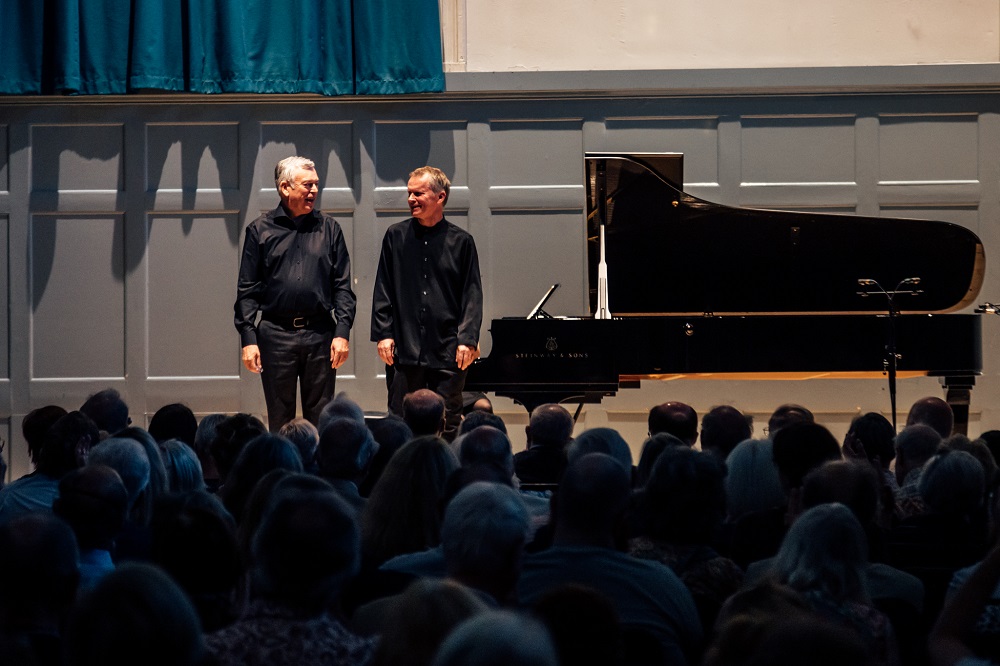 Martineau and Osborne (pictured above) also played a gorgeously delicate performance of Ravel’s Mother Goose Suite, and a searching, deep rendition of Schubert’s F minor Fantasie, a physically demonstrative performance where they both nodded and shook their heads vigorously to match the musical mood.
Martineau and Osborne (pictured above) also played a gorgeously delicate performance of Ravel’s Mother Goose Suite, and a searching, deep rendition of Schubert’s F minor Fantasie, a physically demonstrative performance where they both nodded and shook their heads vigorously to match the musical mood.
Thoughts about “great” music came back to me in the Scottish Chamber Orchestra’s evening concert of 20th century music (★★★★), mostly because it finished with Robert Russell Bennett’s Symphonic Picture on Gershwin’s Porgy and Bess. I’ve no doubts about Gershwin’s terrific melodies, of course: my question mark came with Bennett’s orchestral medley, which strings the tunes together slightly at random and, more seriously, neuters Gershwin’s ramshackle orchestration by smoothing things over and cutting the orchestral piano. 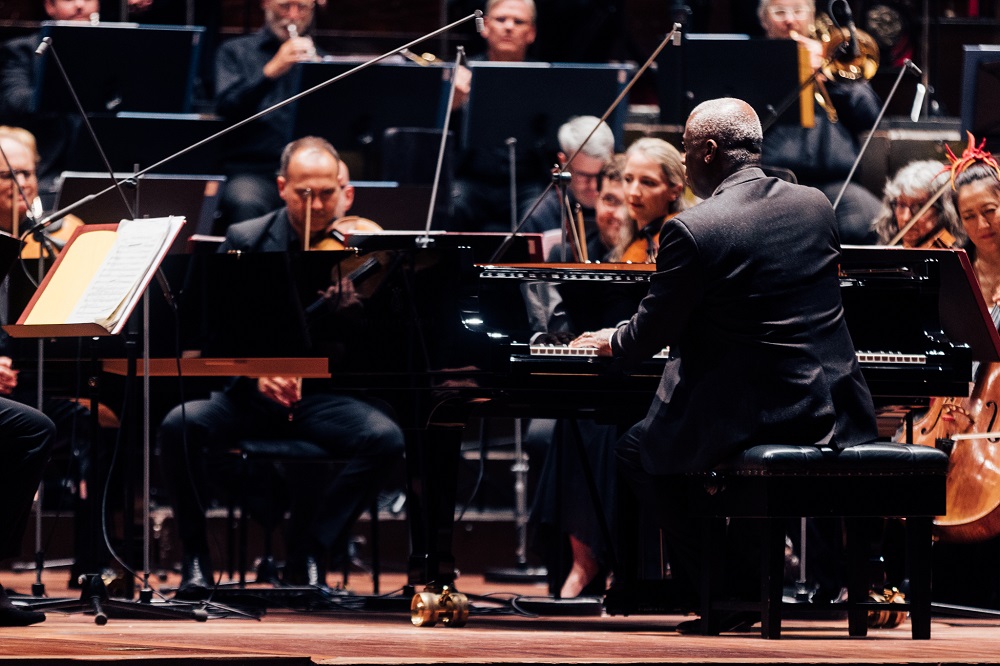 No complaints elsewhere in the concert, though, with a terrific performance of Rhapsody in Blue. Wayne Marshall conducted from the keyboard, which he pummelled to within an inch of its life during the extended solos, and I mean extended! I don’t think I’ve ever heard this piece with longer piano solos! However, it seemed to work because Marshall made the whole piece sound like an improvisation, and not just the bits that actually were. That mood spread into the orchestra, too, not least with a terrifically sleazy opening clarinet solo, chock-full of portamenti, but full of fun. In short, every clarinettist’s dream.
No complaints elsewhere in the concert, though, with a terrific performance of Rhapsody in Blue. Wayne Marshall conducted from the keyboard, which he pummelled to within an inch of its life during the extended solos, and I mean extended! I don’t think I’ve ever heard this piece with longer piano solos! However, it seemed to work because Marshall made the whole piece sound like an improvisation, and not just the bits that actually were. That mood spread into the orchestra, too, not least with a terrifically sleazy opening clarinet solo, chock-full of portamenti, but full of fun. In short, every clarinettist’s dream.
Bernstein’s Fancy Free and Copland’s El Salón México also benefited from supersized orchestral sound that you rarely expect from a chamber orchestra, but with lots of saucy details, too, such as the smoochy strings and bouncy rhythms in the Copland.
Marshall finished with a chaotically brilliant improvisation on I Got Rhythm, played on the mighty Usher Hall organ. Sure, it upstaged the orchestra, it was more than a little self-indulgent, and it definitely wasn’t “great” music; but I cheered at the end, nonetheless.
Explore topics
Share this article
The future of Arts Journalism
You can stop theartsdesk.com closing!
We urgently need financing to survive. Our fundraising drive has thus far raised £49,000 but we need to reach £100,000 or we will be forced to close. Please contribute here: https://gofund.me/c3f6033d
And if you can forward this information to anyone who might assist, we’d be grateful.

Subscribe to theartsdesk.com
Thank you for continuing to read our work on theartsdesk.com. For unlimited access to every article in its entirety, including our archive of more than 15,000 pieces, we're asking for £5 per month or £40 per year. We feel it's a very good deal, and hope you do too.
To take a subscription now simply click here.
And if you're looking for that extra gift for a friend or family member, why not treat them to a theartsdesk.com gift subscription?
more Classical music
 Two-Piano Gala, Kings Place review - shining constellations
London Piano Festival curators and illustrious friends entertain and enlighten
Two-Piano Gala, Kings Place review - shining constellations
London Piano Festival curators and illustrious friends entertain and enlighten
 Echo Vocal Ensemble, Latto, Union Chapel review - eclectic choral programme garlanded with dance
Beautiful singing at the heart of an imaginative and stylistically varied concert
Echo Vocal Ensemble, Latto, Union Chapel review - eclectic choral programme garlanded with dance
Beautiful singing at the heart of an imaginative and stylistically varied concert
 Scott, Irish Baroque Orchestra, Whelan, RIAM, Dublin review - towards a Mozart masterpiece
Characteristic joy and enlightenment from this team, but a valveless horn brings problems
Scott, Irish Baroque Orchestra, Whelan, RIAM, Dublin review - towards a Mozart masterpiece
Characteristic joy and enlightenment from this team, but a valveless horn brings problems
 Classical CDs: Voice flutes, flugelhorns and froth
Baroque sonatas, English orchestral music and an emotionally-charged vocal recital
Classical CDs: Voice flutes, flugelhorns and froth
Baroque sonatas, English orchestral music and an emotionally-charged vocal recital
 Kanneh-Mason, Britten Sinfonia, Shave, Milton Court - a grin and a big beaming smile
A pair of striking contemporary pieces alongside two old favourites
Kanneh-Mason, Britten Sinfonia, Shave, Milton Court - a grin and a big beaming smile
A pair of striking contemporary pieces alongside two old favourites
 theartsdesk at the New Ross Piano Festival - Finghin Collins’ musical rainbow
From revelatory Bach played with astounding maturity by a 22 year old to four-hand jazz
theartsdesk at the New Ross Piano Festival - Finghin Collins’ musical rainbow
From revelatory Bach played with astounding maturity by a 22 year old to four-hand jazz
 First Person: Manchester Camerata's Head of Artistic Planning Clara Marshall Cawley on questioning the status quo
Five days of free events with all sorts of audiences around Manchester starts tomorrow
First Person: Manchester Camerata's Head of Artistic Planning Clara Marshall Cawley on questioning the status quo
Five days of free events with all sorts of audiences around Manchester starts tomorrow
 Goldscheider, Brother Tree Sound, Kings Place review - music of hope from a young composer
Unusual combination of horn, strings and electronics makes for some intriguing listening
Goldscheider, Brother Tree Sound, Kings Place review - music of hope from a young composer
Unusual combination of horn, strings and electronics makes for some intriguing listening
 theartsdesk Q&A: composer Donghoon Shin on his new concerto for pianist Seong-Jin Cho
Classical music makes its debut at London's K-Music Festival
theartsdesk Q&A: composer Donghoon Shin on his new concerto for pianist Seong-Jin Cho
Classical music makes its debut at London's K-Music Festival
 Helleur-Simcock, Hallé, Wong, Bridgewater Hall, Manchester review - moving lyricism in Elgar’s concerto
Season opener brings lyrical beauty, crisp confidence and a proper Romantic wallow
Helleur-Simcock, Hallé, Wong, Bridgewater Hall, Manchester review - moving lyricism in Elgar’s concerto
Season opener brings lyrical beauty, crisp confidence and a proper Romantic wallow

Add comment